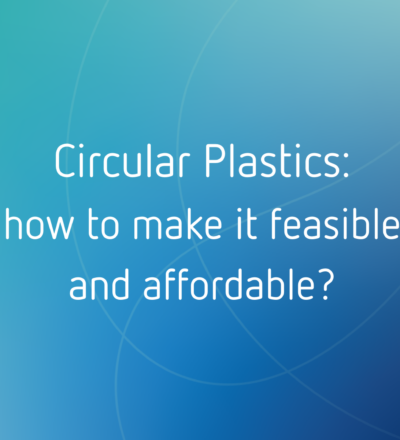In order to promote the circularity of plastics on an industrial scale, we need to work more effectively together. And that primarily means understanding each other’s roles, so that each step of the chain can take into account the previous and the next steps. For this reason, the Circular Plastics Conference 2022 will focus on design, sorting, recycling and organising the whole chain. This will give you insight in how to fulfil the role of both producer and supplier in this value chain.
The willingness to collaborate in the field of circular plastics is great. This is evidenced by the enthusiasm with which parties in the value chain are joining the Circular Plastics Initiative (CPI) and engaging with each other. But still in Europe, only 20% of plastic production is reused.
Recycling of plastics: now and in the future
But how do we design and implement this collaboration? And what to choose first? That is the struggle many companies are facing today. A noted problem is that recycling processes are still evolving, so it is not clear how recycling will be carried out in the future. Also recycling is gradually, but still not enough, taken into consideration in the design process. In this area, cooperation would lead to great results.
Chain dependency to keep recycling of plastics affordable
Within CPI, we see that many companies want to take their responsibility and are actively engaged in making more recyclable plastics. In the long run, this will result in business dependency: each step of the chain is dependent on the previous and the next step. By working together, the standard business model of a linear society will come under pressure and we can accelerate the transition to circular plastics.
At the moment, for example, there are the Extended Producer Responsibility (EPR) schemes for the collection of plastics, among other things. In doing so, only end users are responsible to recycle the products. But we want to optimize recycling throughout the chain. So each step in the chain must be held accountable for its role in achieving optimal recycling. This is the only way recycling will remain affordable.
This article is part of a series of 3
- Circular Plastics: how to make it feasible and affordable?
- The need for data monitoring and modelling through mass balance analysis and circularity evaluation
- The need for knowledge-based design of plastic products
Or join our special LinkedIn-page on circular plastics.
Research on recycling technology: benefiting the entire chain
Working together also means doing research together. If you want to be both a producer and a supplier, there needs to be more clarity on how to influence the quality of the recycled material and what will be the role of design, recycling and sorting technologies of the future. For that reason, studies should answer these 3 questions:
- How to get a better understanding and overview of the quantities and qualities of the various types of plastics?
- How to develop a system that functions as cheaply as possible and allows everyone to take responsibility?
- How to achieve a system where the recycling and the quality of recycled material come in line with the targets?
In summary, many companies desire to, but still find it difficult to oversee what they can do to make impact and where to start. So how to collaborate and make impact?
Circular Plastics Initiative
The Circular Plastics Initiative is taking on that role, investing heavily in knowledge sharing, involvement in new initiatives, and active engagement in the further development of recycling processes and design that lead to full circularity. Everyone who is part of the value chain is therefore cordially invited to the Circular Plastics Conference (CPC’22) on May 18 and 19, 2022 in Eindhoven, the Netherlands.
Together with key players in our community, we will discuss the different facets in the development of circular plastics. In doing so, we take a problem-solving approach, focusing on new technologies, techniques and processes. Collectively, we have so much knowledge and energy that we can actually take the steps outlined in the Circular Plastics Roadmap. At CPC’22, we will join forces to achieve success in circularizing as much plastic as possible.
Join our LinkedIn-page to stay up to date.
